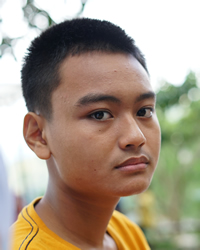Maiwa in Indonesia

Photo Source:
Copyrighted © 2026
Herwin Bahar - Shutterstock All rights reserved. Used with permission |
Send Joshua Project a map of this people group.
|
| People Name: | Maiwa |
| Country: | Indonesia |
| 10/40 Window: | Yes |
| Population: | 41,000 |
| World Population: | 41,000 |
| Primary Language: | Maiwa (Indonesia) |
| Primary Religion: | Islam |
| Christian Adherents: | 1.00 % |
| Evangelicals: | 0.00 % |
| Scripture: | Portions |
| Ministry Resources: | No |
| Jesus Film: | Yes |
| Audio Recordings: | No |
| People Cluster: | Malay |
| Affinity Bloc: | Malay Peoples |
| Progress Level: |
|
Introduction / History
The indigenous Maiwa people live in the low plains and rain forests of the province of South Sulawesi in the nation of Indonesia. Sulawesi is a large mountainous island often described as being shaped like an orchid or crab. It has a coastline of about 5,000 kilometers and consists mainly of four peninsulas separated by deep gulfs. The Maiwa live in the central section of one of the southern peninsulas. The Maiwa make their living farming, raising animals and fishing. They possess their own language of Maiwa. Portions of the Bible and Gospel Recordings are available in Maiwa.
Indonesia gained its freedom from the Netherlands in 1949. It is the largest Muslim majority country in the world as well as the fourth largest nation by population. Indonesia consists of over 17,000 islands of which 10,000 are inhabited. Indonesia has oil, natural gas and mineral assets but the average Maiwa does not benefit from the nation's wealth.
What Are Their Lives Like?
The Maiwa are primarily farmers, growing rice in irrigated fields. Rice is their main staple food. Maiwa also cultivate tropical fruit, vegetables, and sugar palms which are processed into palm sugar. They raise water buffalo, goats and chickens to supplement their diets. Since about one-third of the farmers in southern Sulawesi do not own land, they are forced to sharecrop on the fields of wealthier farmers. These wealthy individuals provide farmland and finances for planting, while the groups of small farmers care for the fields until harvest time. Some Maiwa have moved to cities and sometimes work as day laborers.
The Maiwa people have a family-oriented attitude and practice gotong royong (mutual help and cooperation). The Maiwa marry within their group. Parents and grandparents arrange marriages. A newlywed couple often lives with the wife's family for the first few years of their marriage. The Maiwa tend to have large families as children are viewed as the blessings of Allah. It becomes the sons' responsibility to take care of elderly parents. Many children die young due to the lack of modern medicine. Some remote villages do not have schools. Literacy is low, especially among the girls and women. The Maiwa are an oral culture with traditions passed on through songs, poems, dance and art forms.
What Are Their Beliefs?
The Maiwa people have been Sunni Muslims since the 17th century. Islam was forced upon them by military pressure from their larger and stronger neighbors, the Bugis and Makassar. Since that time, the Maiwa have become loyal devotees of the teachings of Mohammad. Despite this, traditional animistic beliefs are still strong in their daily life. They still believe in the power of unseen spirits that inhabit sacred places. The services of a dukun (shaman/healer/occultist) are often sought for many purposes, including healing the sick and casting out evil spirits. The dukun provides amulets and charms that protect the Maiwa from the evil spirits.
What Are Their Needs?
The Maiwa would benefit from access to modern medicine. Teams of believers can provide that. The Maiwa would benefit from having solar panels for their electrical devices. Most of all the Maiwa need to hear the gospel of Jesus Christ. He alone can forgive their sins and free them from their fear of evil spirits.
Prayer Points
Ask the Lord to send workers to the Maiwa.
Pray the Maiwa parents would be able to provide for their children.
Pray that more Christian resources would be translated into Maiwa.
Pray that the Lord would raise up pastors and Bible teachers for the Maiwa.
Pray for the Lord to raise up a growing church among the Maiwa in this decade.